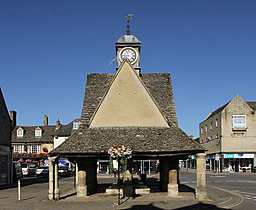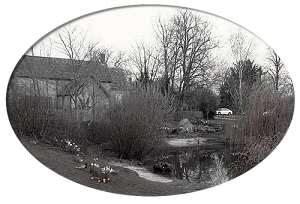|
Witney Congress 2023 |
| |
 |
| |
The Butter Cross,
Witney |
A major reason I want to take
part in the Witney Congress is
that I was brought up in Witney,
leaving in 1979 when my parents
moved and I went to University.
The last time I went to
Cokethorpe School it was with
Wood Green School Rugby XV. I
started playing for the Witney
Chess club in 1976 aged 15, and
played in the league teams,
working my way up to eventually
playing a few on board 1 until I
left. The first team was run by
Jim Samworth (I am pretty sure
of the surname).
I well remember playing in
The Cup and Platter tearooms at
The Butter Cross on a Tuesday
evening.
Best wishes,
John Williams |
|
Looking back |
|
My name is David Norris, and I
used to play for the club as a
teenager in the 1970s. In 1978 I
left to study, and barely played
thereafter.
I read your report and
interview with Keith Broome with
interest, and can maybe supply you
with a few other names from that
period. I certainly remember Keith
and being driven around Oxfordshire
on Thursday evenings to play. If I
remember correctly the club had two
teams then. The top player was
called Anthony Ogus, who I think
lectured at one of the Oxford
colleges. I remember playing against
the OU pieces with John Nunn on top
board, John dashed outside telling
one of his other players that
Anthony could win the exchange and
have a better position, but he
didn't and I'm sure we lost 6-0.
Other notables of the club
were a DJ Williams who was a modern
language teacher at Henry Box. He
ran the school chess club for many
years, and encouraged quite a few of
the school team to also play for
Witney. Apart from myself these also
included Charles Hornsby, Simon
Mills, Peter Baden, and my brother
Martin. Others who I remember from
that time are a John Williams, who
was at Wood Green, there was also a
guy called Tim from Eynsham who had
a stall at Witney market. There are
a few more who I can remember, but
the names are eluding me at present.
I can see that the chess club
is far stronger than it was in my
day, so it is nice to see it as a
success. Hope you find this useful.
Best wishes,
David Norris |
|
|
Chess Player's
Chronicle
A browse
through "Chess Player's Chronicle" for
1842 unearthed the following entry on
page 93:
"H. S.,
WITNEY." - We have received, through the
hands of Mr. Goode, proprietor of "The
European Chess Rooms", a communication,
intended for the Editor of this
Magazine, and have to express our thanks
to "H. S." for his polite attention to
our request.
Who "H.
S." was, or indeed whether the "polite
attention to our request" was a reply to
the editor's request for a list of
Witney Chess Club members, is not
explained. As so often, the details are
probably lost for ever in the mists of
history.
PS Here's a
paragraph further down on page 79 of 'The
New Book of Witney' (the page containing the
chess reference to which Danny alludes):
In that
century drinking appears to have played a
major part in Witney life, judging from the
number of public houses.
Not much
change since the nineteenth century then
......
-
Mike
Witney CC
Historians in Chief Patrick and Danny have
unearthed some fascinating historical
evidence that Witney Chess was founded not
in the 1960s as I imagined but in fact in
the 1840s (or even earlier for all we know).
Herewith
their respective reports:
(1) An idle
bit of internet research suggests Witney
Chess Club may be older than we realised...
A LOT older. The "Chess Player's
Chronicle" of 1841 (I read it carefully for
all the latest theory) contains the
following intriguing entry on page 400
addressed to"Old 72, Witney Chess Club". The
Chronicle observes that "Neither of the
solutions [sent in by Old 72] is correct.
Will "Old 72" favour us with a list of the
Members of Witney Chess Club ?".
This appears
to strongly indicate that Witney had a chess
club in 1841, and at least one of its
players was writing in (with incorrect
answers) to the Chronicle, which I think was
established a few years previously. This is
seriously old - on page 11, for example,
there is an argument about the "ridiculous
alterations" to the laws of chess (at least
they didn't have digital clocks to deal
with). Mike's previous delving into club
history indicated it was formed in the
1960's - the information from the Chronicle
suggests it was up and running about 120
years before that. Unfortunately "Old 72"
would (if 72 was his age, rather than
grading) now be 245 years old, so we
probably can't ask him/her.
The
Chronicle is available as a free ebook
and you can just search for it on Google.
- Patrick
(2)
Interesting! I found a snippet from a
history of Witney which mentions a Chess
club in the 1860s.
Edward
Smithman, the stationmaster from 1869 till
his sudden death in 1886, was not only one
of the founders of the Witney Trip, but also
a great organiser of cultural events. He was
secretary of the Natural History Society, he
started the Witney Chess Club, and he was a
prime mover in setting up a proper bathing
place on the banks of the Windrush near New
Mill. He also helped to raise money for a
public library.
W.J. Monk
mentions the annual battle that took place
on 5 November between the Up-towns and the
Down-towns, meaning those living south and
north of the Windrush. No folk memory of
this alarming-sounding event survives today.
It seems to have died out around the
beginning of the 19th century.
- Danny
| |
 |
Recently I had the good
fortune to spend some time with Keith Broome and
discuss the origins of Witney Chess Club. For
those of you who don’t know, Keith is our
longest-serving member and, although he doesn’t
get to the club now as often as he used to (crib
apparently taking up his Monday evenings these
days), he still takes an active interest in club
affairs and our juniors in particular as well as
coaching the juniors at Ducklington School along
with Charlie Manning and myself. Keith was
awarded honorary life membership a couple of
years ago in recognition of his services to the
club over the years, including spells as captain
and treasurer. Keith went to Henry Box School,
where he was taught chess by Otto Singer, an
Austrian maths teacher who was also a member of
Oxford City Chess Club. Mr Singer obviously had
a good memory – when Keith bumped into him on
the train when he was in his 40s he recognised
him immediately!
Although I have drawn a blank
so far in trying to locate any Oxfordshire Chess
Association records which might have helped with
the history of the club, Keith did tell me that
Witney Chess Club was formed in the late 60s
when the old Saddlers Arms club at New Yatt
folded. A lady called Sally was apparently the
landlady, but when she had to give up the pub
(her health having been affected by the smoking)
the new landlord had no interest in having chess
players around and asked them to move on. Some
things never change! Sally was apparently a good
player in her own right, playing for the
Saddlers Arms team when it was in Division 1 of
the Oxfordshire League. Keith tells me that
Sally was the first good player he ever beat,
and even then he took six months to do it! Keith
himself only played one game as a stand-in in
Division 1 (which he remembers he lost). Other
club members at the time included Charles Fox
(an RAF officer) and Jim Samworth (who lived in
Aston and worked for the telephone company).
 |
|
When the players were forced
to look elsewhere for accommodation Dave
Crumpler, who used to keep the Globe Cafe in
Corn Street (now a Chinese takeaway), offered
them premises. This turned out to be a
short-lived arrangement, and so they moved to
the Eagle Vaults (Keith has a note in one of his
diaries that the club was playing there in 1974)
and subsequently in the Ivy League Cafe in
Market Square (now Smarts), where the club was
playing in 1977. Mrs Smart, who ran the
restaurant, had a son called Robin who used to
play chess for the club as well. The club stayed
at the Ivy Restaurant for many years, growing to
the stage where it was able to run two teams and
eventually four teams in the Oxfordshire League.
One of Keith’s memories is of John Nunn giving a
simultaneous display at the Ivy League Cafe
(apparently wearing Jesus sandals, although I
have no idea why that particular aspect of
John’s attire has stuck in Keith’s memory!).
Keith is still proud of the fact that he managed
to check the great man. Predictably, only one
person drew; Keith can’t now recall his name,
but it certainly wasn’t him though! Keith also
has a note in his diaries of two jumble sales in
1975 (Langdale Hall, 2 pm start on Saturday! –
Keith’s diaries are obviously very precise in
such matters). These raised a tidy sum of money
for the club, which was short of cash at the
time; the club had a very low annual
subscription with a weekly charge, but if
members didn’t come to the club on the night
they didn’t pay the charge. Is there a lesson in
there somewhere for the English Chess
Federation’s current funding review?!
The move to the Globe Cafe of
course wasn’t the end of the club’s
peregrinations, with subsequent moves to the
Plough in 1982, where the club stayed until
1993. The club then moved to the first floor of
the Corn Exchange when the landlord gave up the
Plough and the new landlord gave the club
notice, and then on to Langdale Hall before
finishing up at its current location in
Ducklington Village Hall. Club stalwarts over
that time that Keith remembers particularly (and
will be known to many of you) were Arthur
Mushens, who was a warrant officer in the RAF
and ran the RAF chess club before moving to
Witney Chess Club (maybe Alec Toll can fill in
some more information about Arthur’s career in
the RAF?), Geoff Tustian, a farmer who joined
the club when the club at Chipping Norton folded
but who died at quite a young age, Mike Robins,
a teacher who lived in Standlake and who finally
had to give up chess because of worsening
eyesight, and Doug Reed, who Keith reckons would
now be in his 90s. During this time Keith
remained active in club affairs, running the
third and fourth teams and acting as treasurer
before Howard Searle took on that particular
role. One of Keith’s memories as a committee
member is of attending a meeting at the home of
another committee member who was already in a
hilarious condition at the start of the evening
and proceeded to share his home made wine with
other committee members over the course of the
evening. I’m sure you’re reassured that your
present committee members are such a sober lot.
If any of you have any
historical records about the club I would be
very glad to hear from you. In the apparent
absence of any Oxfordshire Chess Association
records from the early years, information about
the history of the club is still very
incomplete, and it would be great if we can
collectively fill in some more of the missing
parts.
|